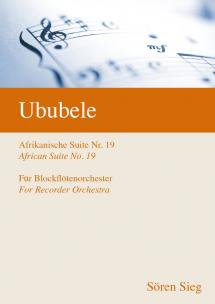Ububele

Pour orchestre de flûtes à bec
ATTBBGGKKK
Premier mouvement: Amaza (flots)
Deuxième mouvement: She's still there
Troisième mouvement: Fa wo do yi mame (Restons ensemble)
Ububele signifie bonté en xhosa. Lorsqu'on a demandé au célèbre comédien et auteur-compositeur allemand Hanns Dieter Hüsch, à la fin de sa vie, quel avait été le but de son travail, il a répondu : « Apporter plus de bonté dans le monde ». J'ai été très impressionné lorsque j'ai entendu cette réponse pour la première fois. Non pas la « liberté », la « justice », l'« égalité » (tant d'innocents ont été tués pour ces idéaux) - non, la bonté, un objectif assez modeste, mais que nous pouvons réaliser (et certainement moins dangereux). La gentillesse et la chaleur sont également des qualités que j'ai rencontrées lors de mes voyages en Afrique subsaharienne. C'est exactement ce type d'énergie positive que j'ai essayé d'exprimer ici, dans ma 19e Suite africaine. Je l'ai écrite pour mon premier atelier de flûte à bec à Lyme Regis en février 2017, auquel Tom Beets m'avait gentiment invitée. Comme de nombreux participants avaient apporté beaucoup de flûtes à bec basses (David a même apporté une Sub Great Bass, une sous la Contra Bass !), j'ai profité de l'occasion pour écrire quelque chose de doux et détendu qui repose totalement sur les qualités sonores des flûtes à bec basses ; la partie la plus aiguë de toute la Suite est une seule flûte à bec alto. Je peux imaginer l'ensemble de la pièce aussi bien avec un ensemble d'une partie qu'avec un orchestre de flûtes à bec.
Le premier mouvement, « Amaza (vagues) », est particulièrement doux et détendu et se déroule dans ma mesure préférée de 12/8. Cette pièce doit être jouée de manière très groovy, en particulier le thème principal. Profitez-en, jouez de manière décontractée, imaginez-vous dans un village rural au bord de la mer Victoria, sans ordinateur portable, sans smartphone, mais avec des noix de coco et des ananas qui poussent partout.
Le deuxième mouvement, « She's still there », est très émouvant. Il parle d'un amour profond et d'une grande nostalgie, et c'est probablement (non, certainement) la plus longue mélodie que j'aie jamais écrite. À Lyme Regis, j'ai fait de longues promenades au bord de la mer, qui semble être un océan, avec ses falaises pittoresques. Imaginez que vous marchez le long d'un rivage sans fin et que vous regardez l'horizon par une journée claire et ensoleillée - et jouez la mélodie avec exactement ce souffle et ce sentiment.
Le troisième mouvement occupe une place particulière dans mon cœur. « Fa wo do yi mame » est en Twi, une langue parlée autour d'Accra, et signifie “Restons ensemble, quoi qu'il arrive”. Les 19 premières mesures peuvent être chantées, par certains ou tous les membres de l'ensemble, ou jouées. Elles doivent être chantées librement et sans crainte, comme si vous appeliez quelqu'un. Je sais que beaucoup de flûtistes à bec sont timides à l'idée de chanter, mais je pense que ce serait une merveilleuse surprise pour le public. J'aime tellement cette pièce que j'en ai écrit plusieurs versions : pour chœur, pour chœur et orchestre, pour quatuor de piano et a cappella. J'espère qu'elles seront toutes jouées un jour. Mais celle-ci était l'originale ! L'expression est, comme dans la plupart de mes troisièmes mouvements, une pure joie.
Je tiens à remercier Josée et Paul pour leur incroyable hospitalité à Lyme Regis, Ruth pour avoir diffusé mes œuvres en Grande-Bretagne, Michael de Hongkong pour avoir attendu si longtemps et patiemment la partition et Tom Beets pour m'avoir toujours ramenée à cette pièce et m'avoir motivée à la terminer et à la publier.
Je suis toujours ravi de recevoir des enregistrements et des lettres : mail@soerensieg.de.
Hambourg, mars 2018